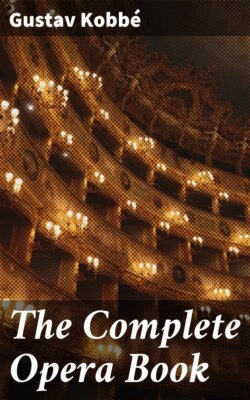Читать книгу The Complete Opera Book - Gustav Kobbé - Страница 25
На сайте Литреса книга снята с продажи.
Why Some Operas are Rarely Given
ОглавлениеTable of Contents
THERE is hardly a writer on music, no matter how advanced his views, who will not agree with me in all I have said in praise of "Orpheus and Eurydice," the principal Mozart operas, Beethoven's "Fidelio," and Weber's "Freischütz" and "Euryanthe." The question therefore arises: "Why are these works not performed with greater frequency?"
A general answer would be that the modern opera house is too large for the refined and delicate music of Gluck and Mozart to be heard to best effect. Moreover, these are the earliest works in the repertoire.
In Mozart's case there is the further reason that "Don Giovanni" and "The Magic Flute" are very difficult to give. An adequate performance of "Don Giovanni" calls for three prima donnas of the highest rank. The demands of "The Magic Flute" upon the female personnel of an opera company also are very great—that is if the work is to be given at all adequately and effectively. Moreover, the recitativo secco (dry recitative) of the Mozart operas—a recitative which, at a performance of "Don Giovanni" in the Academy of Music, New York, I have heard accompanied by the conductor on an upright pianoforte—is tedious to ears accustomed to have every phrase in modern opera sung to an expressive orchestral accompaniment. As regards "Fidelio" it has spoken dialogue; and if anything has been demonstrated over and over again, it is that American audiences of today simply will not stand for spoken dialogue in grand opera. That also, together with the extreme naïveté of their librettos, is the great handicap of the Weber operas. It is neither an easy nor an agreeable descent from the vocalized to the spoken word. And so, works, admittedly great, are permitted to lapse into unpardonable desuetude, because no genius, willing or capable, has come forward to change the recitativo secco of Mozart, or the dialogue that affronts the hearer in the other works mentioned, into recitatives that will restore these operas to their deserved place in the modern repertoire. Berlioz tried it with "Der Freischütz" and appears to have failed; nor have the "Freischütz" recitatives by Costa seemingly fared any better. This may have deterred others from making further attempts of the kind. But it seems as if a lesser genius than Berlioz, and a talent superior to Costa's, might succeed where they failed.
